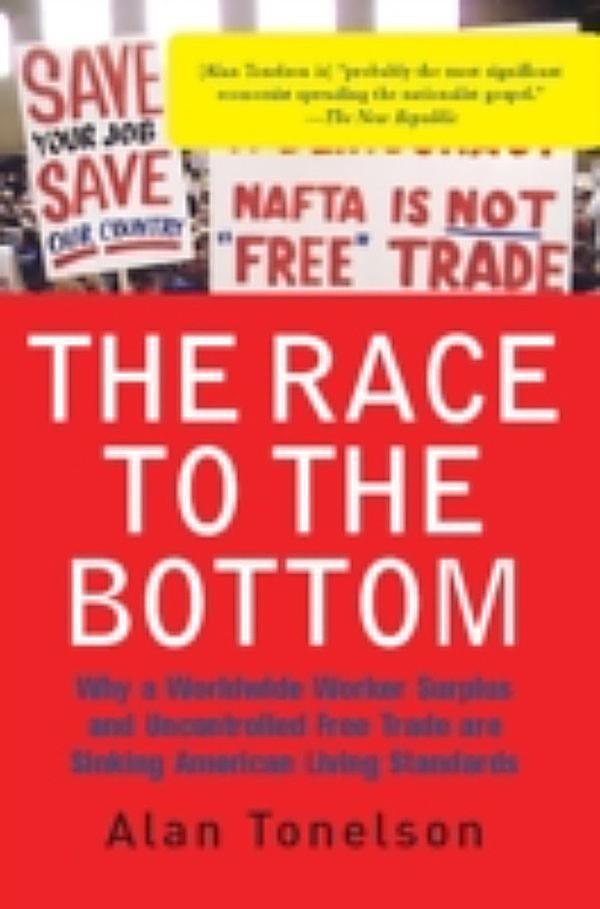The Race To The Bottom
Nov 27, 2013.. Evidence for a race to the bottom is pretty patchy. But a recent paper* (earlier, non-paywall version here) makes for uncomfortable reading.
Michael Goldhaber has an interesting piece on American Lawyer, Marty Lipton's War on Hedge Fund Activists. The article mostly uses as a template for the discussion the views of Marty Lipton and Lucian Bebchuk (with a bit of CJ Strine thrown in). Mr. Lipton was described as asserting that "activism is awful for companies and the economy over the long run."


Feb 25, 2015.. INFLATION rates around the world have been sinking over the last three years. Pervasive economic weakness in the rich world and a ..

Race to the bottom

The race to the bottom is a socio-economic phenomenon in which governments deregulate the business environment or taxes in order to attract or retain economic activity in their jurisdictions, resulting in lower wages, worse working conditions and fewer environmental protections. An outcome of globalization and free trade, the phenomenon may occur when competition increases between geographic areas over a particular sector of trade and production. The concept of a regulatory "race to the bottom" emerged in the United States during the late 19th and early 20th century, when there was charter competition among states to attract corporations to domicile in their jurisdiction. Some described the concept as the "race to efficiency", and others, such as Justice Louis Brandeis, as the "race to the bottom". In the late 19th century, joint-stock company control was being liberalised in Europe, where countries were engaged in competitive liberal legislation to allow local companies to compete. This liberalization reached Spain in 1869, Germany in 1870, Belgium in 1873, and Italy in 1883. In 1890, New Jersey enacted a liberal corporation charter, which charged low fees for company registration and lower franchise taxes than other states. Delaware attempted to copy the law to attract companies to its own state. This competition ended when Governor Woodrow Wilson tightened New Jersey's laws through a series of seven statutes.[ In academic literature, the phenomenon of regulatory competition reducing standards overall was argued for by A.A. Berle and G.C. Means in The Modern Corporation and Private Property (1932), while the concept received formal recognition by the US Supreme Court in a decision of Justice Louis Brandeis in the 1933 case Ligget Co. v. Lee (288 U.S. 517, 558–559). Brandeis's "race to the bottom" metaphor was updated in 1974 by William Cary, in an article in the Yale Law Journal, "Federalism and Corporate Law: Reflections Upon Delaware," in which Carey argued for the imposition of national standards for corporate governance. Sanford F. Schram explained in 2000 that the term "race to the bottom": “ ...has for some time served as an important metaphor to illustrate that the United States federal system—and every federal system for that matter—is vulnerable to interstate competition. The "race to the bottom" implies that the states compete with each other as each tries to underbid the others in lowering taxes, spending, regulation...so as to make itself more attractive to outside financial interests or unattractive to unwanted outsiders. It can be opposed to the alternative metaphor of "Laboratories of Democracy". The laboratory metaphor implies a more sanguine federalism in which [states] use their authority and discretion to develop innovative and creative solutions to common problems which can be then adopted by other states. ” In 2003, in response to reports that British supermarkets had cut the price of bananas, and by implication had squeezed revenues of banana-growing developing nations. Alistair Smith, international co-coordinator of Banana Link, said "The British supermarkets are leading a race to the bottom. Jobs are being lost and producers are having to pay less attention to social and environmental agreements." Beggar thy neighbour Convergence (economics) Global workforce Globalization Government failure Flag of convenience Free trade Law of rent Multinational corporation Pollution haven hypothesis Prisoner's dilemma Supply and demand Temporary work Tragedy of the commons Vogel, David. 1995. Trading Up: Consumer and Environmental Regulation in a Global Economy. Cambridge, MA: Harvard University Press. ISBN 0-674-90084-7 Definition from the Financial Times Lexicon "Racing to the bottom" in The Economist Yablon, Charles M., "The Historical Race Competition for Corporate Charters and the Rise and Decline of New Jersey: 1880-1910", The Journal of Corporation Law (2007)
- The race to the bottom is a socio-economic phenomenon in which governments deregulate the business environment or taxes in order to attract or retain ..
- 8 hours ago.. the Race to the Bottom. Home. The race to remain competitive as a state amenable to business interests is never-ending. The race has ..
- Definition of race to the bottom. The situation in which companies and countries try to compete with each other by cutting wages and living standards for workers, ..
- During the transitional stages before a developing nation becomes developed, one of the many factors that will catalyze development is the source of jobs.
- With the end of the 1990s economic boom, The Race to the Bottom deftly explores how the United States has entered a no-win global competition in which the ..